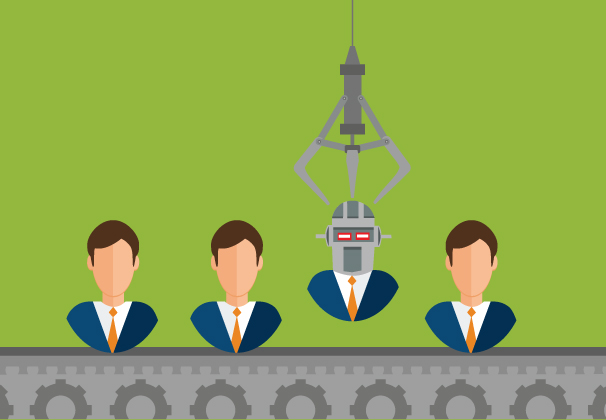
Robots will take some jobs—but will create plenty for those well-prepared.
As a researcher who has worked in robotics since the early 1990s, I’ve witnessed firsthand the enormous strides that this research area has made. Today we have robotic vacuum cleaners like Roomba scouring carpets in homes, drones delivering consumer products to our doorsteps, and self-driving cars just waiting to be rolled out on a massive scale.
But with the breathtaking pace of technological advance has come increased anxiety, voiced both by economists and American workers. Often when people find out what I do for a living, they have one question: Will robots take away our jobs?
A 2016 Forrester report, for example, concluded that robots and other cognitive technologies (such as artificial intelligence and machine learning) will replace 7 percent of U.S. jobs by 2025. Already, we’ve seen how automation has replaced factory workers, and personal computer technologies have essentially eliminated jobs such as travel agents.
What’s interesting to me is how that figure is derived: An estimated 16 percent of jobs will be replaced, while the equivalent of 9 percent of jobs will be created. “The cognitive era will create new jobs, such as robot monitoring professionals, data scientists, automation specialists, and content curators,” according to Forrester, which forecasts 8.9 million new jobs in the U.S. by 2025.
I’d like to suggest that we focus on the job creation part of the equation. If you consider the year 1900, some 20 out of every 50 Americans were involved in farming. Now that figure is 1 out of 50, economists observe. Over the last 100-plus years, Americans have moved from farms to factories to offices. They now have jobs that nobody could have imagined 100 years ago, such as “webmaster,” “data scientist,” and “blogger.”
Economies reshape over time. Let’s face it: Low-wage, low-skill workers are not, and will never be, in a good position regardless of robotics. Rather than focusing on whether robots will displace some human workers, let’s put our collective energy into tackling a different question: How are we preparing the work force for the future? How will we equip American workers with the technological skills they need for jobs that could ultimately be better paying?
Addressing this question requires action at the policymaker level. We need STEM education from an early age, but we also need programs to train those people whose jobs have been or will be disrupted by offshoring manufacturing, increased automation, and potentially robotics. Incentivizing citizens to embrace education is a matter of policy and politics rather than science and technology.
It’s important to remember, too, that the vast majority of jobs are not going away. As a robotics expert, I can say that robots will not be able to do skilled work such as carpentry or auto repair or plumbing for the foreseeable future. Nor will robots be able to exhibit any form of creativity or sentience.
Even in fields where robotics will become commonplace, people will need to control them. Consider robotic-assisted surgery, which is increasingly being used to make surgery safer and lead to better outcomes. These robots are under the command of skilled surgeons, who have spent many hours training with the machines. With LASIK vision correction, for example, the computer-controlled laser is basically a robot that can operate far faster and more accurately than a person. But rather than taking jobs from eye doctors, the instrument is a tool to produce both better results and greater income.
Speculation about the future of employment is nothing more than a guess. Nobody really knows where the jobs of the future will be, but this cannot be an argument for maintaining the status quo, or even seeking comfort by reverting to practices of a sentimentalized past.
Gregory Chirikjian ’88, MSE ’88, is a professor of mechanical engineering and director of the Whiting School’s Robot and Protein Kinematics Laboratory. He participated in a National Press Foundation forum on this topic with Wall Street Journal economics editor Sudeep Reddy, now at Politico, in October 2016.




